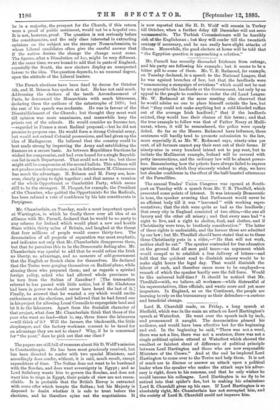The French elections have been fixed by decree for October
4th, and M. Brisson has spoken at last. He has not said much. Addressing the electors of the tenth Arrondissement of Paris, he denounced the Monarchists with much bitterness, declaring them the authors of the catastrophe of 1870; but the rest of his speech was moderate. He was in favour of the Disestablishment of the Church ; but thought they must wait till opinion was more unanimous, and meanwhile keep the priests out of the schools. He would consider an Income-tax, —regarded in France a most Radical proposal,—bat he did not promise to propose one. He would form a strong Colonial army, but would not extend Colonial possessions, and had given np the idea of Madagascar. He believed that the country could be best made strong by improving the Army and establishing the finances on a secure basis. As between Republican fractions he wished for compromise, and had even hoped for a single Republi- can list in each Department. That could not now be ; but there might still be compromise at the second ballots. This address will not produce much impression; and in definiteness M. Cl6mencean has much the advantage. M. Brisson and M. Ferry are, how- ever, clearly going to fight together ; and that means a reunion of the whole Opportunist or Gambettist Party, which seems still to be the strongest. M. Floqnet, for example, the President of the Chamber, who quitted the Opportunists for the Radicals, has been refused a vote of confidence by his late constituents in Perpignan.


































 Previous page
Previous page